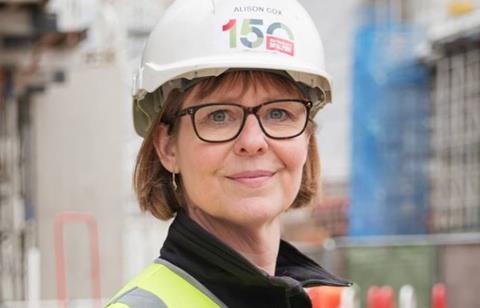Contractor to ditch regional focus and concentrate on sectors with push into more infrastructure work
Sir Robert McAlpine is cutting around 60 jobs, waving goodbye to two senior directors and switching its focus to sectors rather than regions under a major rejig of the business by chief executive Paul Hamer.
The most eye-catching departures are the firm’s London boss, Alison Cox, a McAlpine board member who has been in the post for just 18 months, and the managing director of its Southern business Ian Cheung who has been with the firm seven years.
But McAlpine is bringing back Grant Findlay as executive managing director of a newly formed ��ɫ����TVs division and who will now sit on a refreshed group board.
Findlay, a former strategy director at the firm, left the business after 11 years last spring to join Madison Square Garden Company, the US entertainment giant behind the Sphere music venue.

But that scheme has stalled and in February communities secretary Michael Gove left the door open to the development, which has attracted hundreds of objections, being called in for a planning inquiry at some stage.
>>See also: An interview with Alison Cox, London MD of Sir Robert McAlpine
>>See also: In Business: Where McAlpine sees its future
Cox, whose association with McAlpine stretches back to her days as an engineering undergraduate at Oxford University in 1990, took on the London role in September 2021, replacing Paul Heather who has since joined McLaren as group managing director of its construction business.
McAlpine said she was leaving to work on an unspecified “passion project” at St John’s College, Cambridge, adding it was “too rare a chance” for her to miss out. “We wish her every success in her future endeavours.” The firm said Cheung was on hand for the next six months to help with the transition and also wished him well for the future.
Under the rejig, McAlpine, which yesterday signed a deal to carry out work on the £500m Temple Quarter Enterprise Campus for Bristol University, has said it will focus on sectors rather than regions and added: “The business will move from a regional operating model to a sector-focused model, with national centres of excellence providing projects with swift access to expertise.
“The change will result in a leaner organisation which is expected to reduce the current workforce by circa 2.5%.”
Hamer said: “These changes are needed to enhance our operational agility. They mean we can move rapidly whilst generating improved efficiency and productivity. This does unfortunately result in a small number of roles becoming redundant, which is a difficult but necessary decision.”
McAlpine said it “will focus on sectors where it excels and accelerate growth in its infrastructure business” and was prioritising areas where it has traditionally been most successful – which include healthcare, commercial offices, industrial, as well as the heritage and complex schemes delivered by its major and special projects team.
And it added: “[The firm] is simultaneously growing the rail, transport and nuclear sectors of its infrastructure business. This will drive profitable growth and minimise its exposure to ongoing geo-political and market risks.”
Two years ago, Hamer told ��ɫ����TV the firm was looking to target more civils and infrastructure work over the next half decade, adding: “Being mostly building and mostly private clients is not a sustainable place to be for a 152-year-old firm. Infrastructure is public sector, it’s long-term and it’s more benign in terms of contracting terms.”
But one rival said flipping from a regional model to a sector focus one was not an easy transition. “It’s been tried before elsewhere with mixed results. It’s a people industry and demographics play a big part in people relationships.”
Hamer said the changes will take effect from 1 May and added: “Throughout our history, [we] have successfully overcome obstacles by remaining agile and adapting to evolving market conditions.
“The challenges that the industry is currently facing are exceptional and unprecedented. In this turbulent market, we owe it to our people and our clients to carefully consider how we apply our focus and expertise over the coming years to seize the opportunities that will support us to thrive.”
In its last set of accounts for the year to October 2021, the firm employed 2,332 people, improved turnover 13% to £1bn and returned to the black with a pre-tax profit of £9m from a £14m loss last time.
Capital concerns
The departure of Alison Cox means the top two figures at London, traditionally McAlpine’s biggest business with nearly half of the firm’s staff, will no longer be there after her deputy Vince Lydon took early retirement at the end of February.
Cox took the top role in London 18 months ago, nine years after rejoining the group following a nine year career break in which she told ��ɫ����TV last year she nearly retrained as a teacher.

The capital has been a stronghold for the business over the years and its jobs in the city read like a who’s who of the most high-profile and prestigious construction projects imaginable from the Emirates stadium, to the Olympic stadium, the British Library, the Millennium Dome through to the Sainsbury Wing at the National Gallery, the ExCeL Centre and the Canary Wharf tower.
But the firm’s most recent win of note has been the Museum of London with the firm notably missing out to a resurgent Lendlease on the scheme to redevelop the former ITV Studios building on London’s South Bank, now awaiting a decision following a planning inquiry, while Kier beat it to the Network ��ɫ����TV meaning, somewhat surprisingly, it still has not won a job for London developer Derwent.
McAlpine’s recent win-rate has left rivals scratching their heads – and even some clients have been left in the dark about what its strategy is in London.
“Alison is a thoroughly decent person but the London development market absolutely is about relationships and who knows who,” one source said. “Alison wasn’t really that sort of person.”
And another source said the changes will clip London’s wings as a consequence. “Taking the power away from London has been an agenda item for years but now it’s really apparent.”


























No comments yet